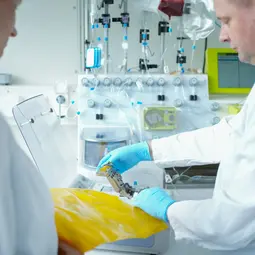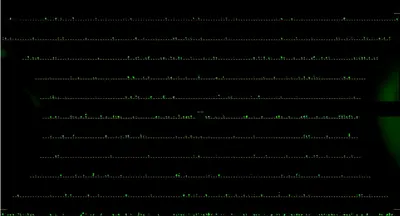Applied Tumor Immunity
- Immunology, Infection and Cancer
- NCT
- Clinical Cooperation Unit

Prof. Dr. Dirk Jäger
Tumors and tumor-host-interactions are very heterogenous. Tumor site profiling and the characterization of anti-tumor immune responses give insights into this complex interplay helping to identify prognostic biomarkers and to develop novel treatment approaches. Especially individualized immunotherapeutic strategies and adoptive T cell therapies (ACT) reflect the uniqueness of individual tumors and thus present promising and powerful new treatment options.
Image: © Marius Stark/NCT Heidelberg

Image: © Marius Stark/NCT Heidelberg
Our Research
The immune system influences the efficacy of many therapies and interventions. Thus, the identification of crucial immunological parameters, such as novel biomarkers, is of great importance. The aim of the Clinical Cooperation Unit (CCU) Applied Tumor Immunity is the characterization of immune responses directed against the tumor and the transfer of these findings into clinical applications. A particular focus of our research is the analysis of immunological interactions between tumor cells and host or immune cells in the tumor microenvironment and periphery to identify predictive biomarkers and develop novel immunotherapeutic approaches for solid tumors (e.g. TCR T cells, CAR T cells, bispecific antibodies and peptide vaccines).
In close collaboration with Prof. Jäger's Department of Medical Oncology and other partners at the University Hospital Heidelberg (UKHD) and the Thoraxklinik Heidelberg we conduct innovative clinical trials and biomarker studies, such as the PROMISE trial.
Our current main focus lies on patient-tailored adoptivce T cell therapy (ACT). Together with the Department of Medical Oncology (UKHD), Prof. S. Eichmüller (DKFZ) and with strong support by the Dietmar-Hopp-Foundation we envision to establish a network in the area of immune and cellular therapies which integrates development, GMP production and administration. This will enable us to develop innovative therapy approaches and produce study drugs for Phase I trials at the NCT, the UKHD, for partner sites within the NCT network as well as to serve as manufacturer for approved cellular drugs.
Additional Research Group within the CCU Applied Tumor Immunity
Translational Research in Immuno-oncology and Microbiome (TRIM)
Head: Dr. Maria Paula Roberti
Cellular Therapies

CAR-T cell immunotherapy
Adoptive T cell therapy using genetically engineered T cells expressing a chimeric antigen receptor (CAR) has revolutionized the treatment modalities in leukemia and lymphoma for more than a decade now. However, the translation of the successes to solid tumor diseases is rather slow. Within our team, we are dedicated to the development and manufacturing of novel and safe CARs that can be applied in the clinics. For instance, we have developed two novel CAR-T cell products for the use in breast cancer patients that target the cancer testis antigen NY-BR-1 and prevent cross-reactivity against healthy brain tissue. Our team analyzed both for efficiency and safety in vitro and in vivo in a xenotransplant and target transgenic mouse model.
In close collaboration with Dr. Richard Harbottle (DKFZ, DNA Vector Lab), we have developed a novel DNA-plasmid-based vector system for the GMP-grade manufacturing of CAR-T cells that makes the use of (lenti)viral vectors dispensable. These vectors, which we named nS/MARt, do not possess the risk of genotoxicity but confer the same characteristics as viral vectors, e.g. stable expression (Bozza M et al, 2021, SciAdv, 7(16):eabf1333). As a desired side effect, this novel manufacturing method will reduce overall costs for CAR-T cell production. In another project, we are developing novel, specific CAR inhibitors that can temporarily impair their function and therefore maybe useful to lower clinical side effects. These inhibitors are based on AAV-particles that present matching CAR-epitopes on their surface.
CAR-library establishment
Another task that our team is working on, is the generation of a cell based CAR-library, which will allow the rapid screening for functional, high-quality CAR-T cells against novel or personalized targets. In this project, we combine rapid large-scale transfection technology using nS/MARt vectors with single cell based selection by the use of the Berkeley Lights Lightning System. We aim on developing a pre-selection strategy based on a highly sensitive reporter cell line and FACS sorting followed by multiplexed activation analyses on the opto-electric chip of the Lightning device.
Contact: Patrick Schmidt, PhD - patrick.schmidt(at)nct-heidelberg.de
T cell receptor (TCR) discovery and T cell production
We aim for the development and routine application of personalized TCR gene-engineered adoptive T cell therapies (ACT) targeting individual- as well as shared patient-derived neoepitopes. Based on whole exome or whole genome and tumor mRNA sequencing data, point mutations as well as frameshift mutations are identified and the most promising neoepitopes for each of the patients' six MHC-I (HLA-A, -B, or -C) and/or MHC II molecules are predicted by our pipeline. This state-of-the-art tumor mutanome analysis and in silico T cell epitope prediction is combined with our highly sensitive peptide-loaded MHC-multimer-guided antigen-specific T cell discovery workflow for the identification of epitope-specific TCRs. Our own robust pMHC in-house production platform outperforms commercially available reagents and allows us to provide complete coverage of the individual patients' HLA allotypes. We identify rare neoepitope-reactive T cells directly from peripheral blood, or after in vitro peptide restimulation, in a highly sensitive, multiplex dual-color pMHC-I multimer staining approach followed by T cell single-cell sequencing after systematically evaluating libraries of predicted mutant peptides for successful MHC-I complex binding.
By incorporating DNA-barcoded pMHC-I multimer reagents into the workflow, we link multiplexed tumor antigen recognition with their associated TCR repertoire and T cell differentiation phenotype at single cell resolution, which further improves the selection of TCR/antigen pairs for validation prior to their usage in an ACT. The rigorous implementation of peptide-loaded MHC-I multimer library screenings improved the success rates for the discovery of personalized neoepitope/MHC-I-specific TCR leading to the successful identification and validation of several neoepitope-specific TCRs across various solid tumor entities.
Contact: Marten Meyer, PhD - marten.meyer(at)dkfz-heidelberg.de
Large-scale clinical grade T cell production
We have established manufacturing protocols for the GMP production of CAR-T cells and transgenic TCR-T cells using the semi-automated manufacturing platform CliniMACS Prodigy from Miltenyi Biotec. Protocols are available for the lentiviral vector based production as well as for production using DNA-plasmid vectors. With strong support by the Dietmar-Hopp-Foundation we envision to establish a TCR discovery lab and GMP manufacturing facility for cellular medical products in 2025. This will enable us to develop innovative therapy approaches and produce study drugs for Phase I trials at the NCT, the UKHD, for partner sites within the NCT network as well as to serve as manufacturer for approved cellular drugs.
Contact: Patrick Schmidt, PhD - patrick.schmidt(at)nct-heidelberg.de
Predictive biomarker discovery
The PROMISE trial (PRedictability of Outcome based on iMmunological sIgnatureS in lung cancEr – an explorative investigation) is a collaborative exploratory biomarker study with clinical partners at the Thoraxklinik and UKHD, funded by the Dietmar-Hopp foundation. The trial focusses on the identification of predictive markers or signatures for response and resistance to current standard of care treatment in stage IV non-small cell lung cancer (NSCLC) patients. Biomaterials, such as tissue, serum, plasma, PBMCs, breath condensates and stool samples, are systematically collected longitudinally and will be analyzed by e.g. WGS/WES, PanelSeq, RNASeq, Nanostring, metagenomics, immunohistochemistry and virtual microscopy with semi-automated image analyses, multiplex Cytokine/Chemokine assays, mass spectrometry, RAMAN spectroscopy and flow cytometry. Due to the advancement in high-throughput technologies, we incorporate heterogeneous data from multiple technologies to improve our understanding of the molecular dynamics associated with biological processes. Pipelines for multi-omics data analysis comprising MHC I/II epitope prediction and V(D)J enrichment immune profiling analysis have been set up. Further, we are developing machine- and deep learning approaches on an in-house generated graph database enabling us to extract relevant biological interpretations and to identify novel relationships by integrating high-dimensional data. For an in-depth understanding of the "individual disease" and for the identification of predictive biomarkers, an integrated analysis of the multiomics (Charoentong P et al, 2017, Cell Rep, 18(1):248-62) and wet lab data is performed.
Contact: Inka Zörnig, PhD - inka.zoernig(at)nct-heidelberg.de | Pornpimol Charoentong, PhD - pornpimol.charoentong(at)nct-heidelberg.de
The translational research program of the NEOMUN trial ("NEOadjuvant anti-PD-1 imMUNotherapy in resectable NSCLC: The NEOMUN Trial") is supported by NCT POC trial funding and is carried out in the CCU/NCT 3.0 TME Unit in collaboration with PD Dr. M. Eichhorn and colleagues (Surgery Department, Thoraxklinik Heidelberg). A major aim is the analysis of possible therapy-associated changes in different tumor regions (e.g. core vs. border), lymph nodes or healthy lung tissue and the potential identification of predictive markers.
Contact: Inka Zörnig, PhD - inka.zoernig(at)nct-heidelberg.de | Pornpimol Charoentong, PhD - pornpimol.charoentong(at)nct-heidelberg.de
The IReP trial ("Immune Response Prediction" trial; funded by the Dietmar-Hopp Foundation) is an exploratory study evaluating the potential of immune signature profiling for predicting response to neoadjuvant chemoimmunotherapy in patients with resectable stage II/III non-squamous NSCLC. An in depth analysis of the tumor microenvironment and genomic alterations is performed in pre- and post-treatment tissue and data is correlated with response as defined by Major pathologic response. The trial is performed in collaboration with PD Dr. M. Eichhorn (Department of Surgery, Thoraxklinik).
Contact: Inka Zörnig, PhD - inka.zoernig(at)nct-heidelberg.de | Pornpimol Charoentong, PhD - pornpimol.charoentong(at)nct-heidelberg.de
Additional Projects
Our projects on ‘Tumor-host interactions in the tumor microenvironment’ and ‘Bispecific antibodies’ are conducted in close collaboration with Prof. Jäger's Research Group Tumor Immunology (Department of Medical Oncology, UKHD). Details about this research can be found on the Tumor Immunology webpage.
Sub-Group: Translational Research in Immuno-oncology and Microbiome (TRIM)
Team
We are a multidisciplinary team of wet-lab scientists, physicians and computational scientists.
-

Prof. Dr. Dirk Jäger
Group head
-
Dr. Marten Meyer
Deputy head, Postdoctoral researcher
-
Daniel Browne
IT system administrator
-
Martina Busacker-Scharpff
Technical assistant
-
Marion Camus
Medical PhD candidate
-
Yuk Ching Chan
Team assistant
-
Dr. Pornpimol Charoentong
Postdoctoral researcher, Bioinformatician
-
Dr. Marcia Figueiredo Goncalves
Postdoctoral researcher
-
Kyra Fuchs
Researcher
-
Isabella Gosch
Technical assistant
-
Monika Hexel
Technical assistant
-
Angela Holzer
Technical assistant
-

Dr. Chen Hong
Postdoctoral researcher, Bioinformatician
-
Iris Kaiser
Technical assistant
-
Dr. Dimitrios Kalatzis
Postdoctoral researcher
-
Annette Köster
Technical assistant
-
Alexandra Krauthoff
Technical assistant
-
Ines Kühnel
Postdoctoral researcher
-
Claudia Luckner-Minden
Technical assistant
-
Priv. Doz. Dr. Frank Momburg
Postdoctoral researcher
-
Jordi Pfeifer Serrahima
Postdoctoral researcher
-
Sabrina Purr
Technical assistant
-

Dr. Patrick Schmidt
Team leader "Cellular therapies", Postdoctoral researcher
-

Dr. Lea Schweßinger
Coordinator
-
Dr. Svenja Schühle
Postdoctoral researcher
-
Selina Seith
Technical assistant
-
Claudia Tessmer
Technical assistant
-
Alexandra Tuch
Technical assistant
-

Dr. Silke Uhrig-Schmidt
Postdoctoral researcher, Equal opportunities and diversity officer
-
Dr. Nektarios Valous
Postdoctoral researcher
-
Sergio Alberto Vasquez Urbina
Researcher, Bioinformatician
-
Franziska Werner
PhD candidate
-
Katharina von Werthern
PhD candidate
-
Dr. Jingyu Yang
Postdoctoral researcher, Bioinformatician
-
Claudia Ziegelmeier
Technical assistant
-
Dr. Inka Zörnig
Project coordination and Lab head, Postdoctoral researcher
Selected Publications
Jäger D, Berger A, Tuch A, Luckner-Minden C, Eurich R, Hlevnjak M, Schneeweiss A, Lichter P, Aulmann S, Heussel CP, Fremd C, Harbottle R, Zörnig I, Schmidt P
Bozza M, De Roia A, Correia MP, Berger A, Tuch A, Schmidt A, Zörnig I, Jäger D, Schmidt P, Harbottle RP
Get in touch with us
